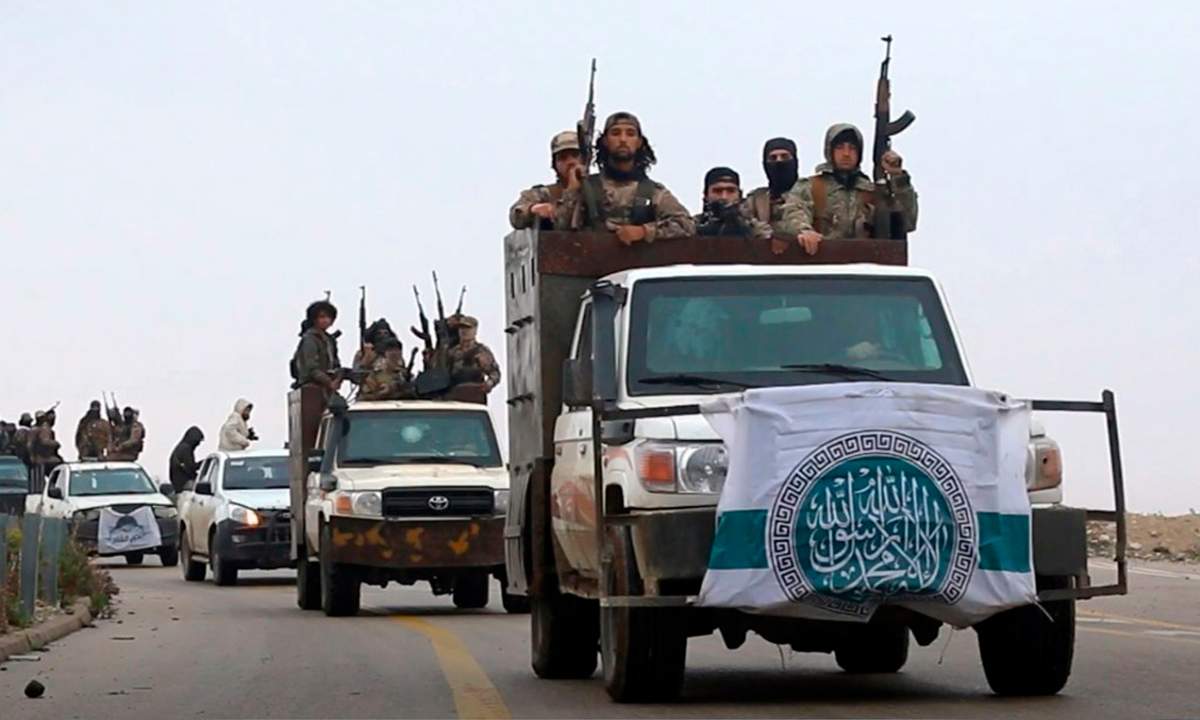Laptops and cellphones bought with Canadian government aid dollars have fallen into the hands of a Syrian terrorist faction, according to documents obtained by Global News.

Gunmen raided an office in northwest Syria and walked off with almost two dozen electronic devices that were part of Canada’s humanitarian contribution to the region, the declassified documents show.
“Our information at this time suggests that the armed men were HTS militants, though we are not able to confirm that definitively,” reads a report released under the Access to Information Act.
HTS is the acronym of Hayat Tahrir al-Sham, an armed Islamist group that grew out of the regional Al Qaeda affiliate Jabhat al-Nusrah and is fighting for “the creation of an Islamic state,” the government says.
The group is on the government’s list of terrorist entities, meaning Canadians face up to 10 years imprisonment for knowingly providing it with property.
The stolen items were listed as 13 iPads, three laptop computers, four projectors, two mobile phones and a two-way radio. They were purchased with $5,000 from Global Affairs Canada’s International Humanitarian Assistance bureau.
“Global Affairs was made aware of reports of criminality resulting in theft in northwest Syria and were in close contact with the impacted NGO on the material loss as well as the safety and security of their staff,” a GAC spokesperson said.
The documents were requested by Global News more than a year ago but were only recently released under the Access to Information Act.
They do not indicate what happened to the materials after they were carried off, but such equipment is commonly used by terrorist groups to communicate and spread propaganda.
The August 2018 incident is “entirely consistent with other reporting about HTS’s behaviour with respect to humanitarian groups,” said Prof. Jessica Trisko Darden, who studies the relationship between international development and conflict.
Like many terror groups, HTS operates a system of taxation and extortion in parts of Syria under its control, she said.
While HTS has stolen food aid from humanitarian organizations, the Canadian-funded technology could prove far more useful, said Darden, an assistant professor at American University’s School of International Service.
“Given the value of the equipment that was taken from that office and given the fact that terrorist groups also need to run logistics, just like humanitarian organizations do, that could actually be significantly more valuable to the terrorist organization from a tactical and logistical perspective,” she said.

Get daily National news
The thefts occurred when between eight and 10 gunmen broke into the office and warehouse of a Canadian-funded non-governmental organization that was winding down its operations in the region.
“This appears to be a case of opportunistic theft by armed militants as the organization nears the final stages of shutdown process,” reads the report on the incident released by Global Affairs.

The attackers “roughed up a guard on duty,” searched the office and tried to steal laptops locked in metal storage containers, according to the report.
“Shortly after their arrival they heard a crowd gathering and fled the scene with only some Wi-Fi routers in their possession,” it said.
“The day after it appears that the same group of armed individuals returned, this time managing to steal the IT devices, equipment and furniture. A couple of batteries and an inverter were also stolen from the warehouse.”
There was no cash or food aid at the office at the time.
A witness who tried to photograph the incident was briefly detained and “roughed up” before being released after an hour, the report said, adding that both he and the guard were “doing OK.”
The Canadian-financed NGO that was robbed was identified in the documents only as “CRS.” That is the acronym of Catholic Relief Services, which was shutting down its office in Idlib, Syria at the time.
The group declined to answer questions.
“All I can tell you is that we do not comment on security incidents,” said Nikki Gamer, media relations manager with the U.S.-based humanitarian organization.
In 2018, the Canadian government gave CRS $1.8 million, according to federal accounts records. The government no longer funds CRS humanitarian programming in Syria.
The Liberal government has committed up to $1.4 billion in humanitarian aid to “conflict-affected populations in Syria, Iraq, Lebanon and Jordan” between 2016 and 2021.
Global Affairs said it had adopted “procedures to mitigate humanitarian assistance from being misused or diverted” but would not provide details of how it had dealt with the thefts in Syria.
The U.S. Office of Inspector General reported last year that employees of a U.S.-based aid group had “knowingly diverted” food aid to HTS after being threatened.
According to the U.S., HTS was formed in 2017 when several extremist factions merged. The “core” of HTS is Jabhat al-Nusrah, which the U.S. calls the “Al Qaeda affiliate in Syria.”
The Jabhat al-Nusrah leader, Muhammad al-Jawlani, is wanted by the U.S. and has a $10-million reward on his head.
The relationship between HTS and Al Qaeda remains uncertain, said Thomas Joscelyn, senior editor of the Long War Journal.
“They have a very sophisticated media operation so any equipment that they can get to further that cause is probably helpful to them,” said Joscelyn, who is also a senior fellow at the Foundation for Defense of Democracies.











Comments